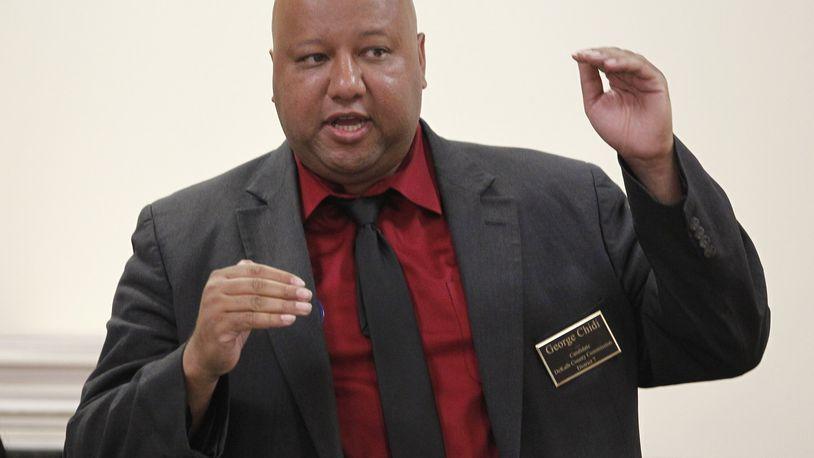
Section Branding
Header Content
Georgia Today: Grand jury subpoenas journalist; Butterfly disappearance; Trade deadline for MLB
Primary Content
On the Tuesday, Aug. 1 edition of Georgia Today: The grand jury investigating 2020 election interference has subpoenaed a journalist; government scientists are asking Georgians to help figure out why butterflies are disappearing; and Major League Baseball's trade deadline is today, so what does that mean for the Braves?

Peter Biello: Welcome to the Georgia Today podcast from GPB News. Today is Tuesday, Aug. 1. I'm Peter Biello. On today's episode, the grand jury investigating 2020 election interference has subpoenaed a journalist. Government scientists are asking Georgians to help figure out why butterflies are disappearing. And Major League Baseball's trade deadline is today. So what does that mean for the Braves? These stories and more are coming up on this edition of Georgia Today.

Story 1:
Peter Biello: A journalist who walked into a secret meeting of Republicans pretending to be Georgia's official presidential electors in December 2020, says he's been subpoenaed to testify before a grand jury in Atlanta's Fulton County. The panel is expected to decide this month whether former President Donald Trump and others should face criminal prosecution for their roles in trying to overturn Georgia's 2020 election results. George Chidi is a freelance writer for several publications, including Rolling Stone and The Atlanta Objective. He says he's well aware of the legal and ethical questions posed by his unusual testimony.
George Chidi: Our work as journalists doesn't work if we are not operating in a democracy. I think that consideration is equally important to all of the journalism shield law stuff around whether or not journalists should be testifying in court.
Peter Biello: He says he's been assured that he won't be asked questions outside of what he saw Trump's fake electors doing at the state Capitol.
George Chidi: I was at the Capitol on Dec. 14 and while I was there to observe the Democratic elector vote. But I noticed that one of the Republican electors — an old friend of mine, actually — was in the building and walked into a room where other people were. And I thought that was curious. So I started a Facebook live stream and walked in asking questions. And when I did, I was asked to leave, escorted out of the room. And in the process of being escorted out — as I'm shouting questions as I'm being hustled out the door — I asked, "What kind of meeting is this?" And somebody said, "It's an education meeting." And it turns out that — and I didn't know this at the time, obviously, but emails had been sent to these electors asking for secrecy in what they were doing. So my observation validated that they were actually maintaining the secrecy.
Peter Biello: He wrote about his decision to testify in an article published yesterday by The Intercept.
Story 2:
Peter Biello: The city of Atlanta is appealing a federal judge's decision that extended the number of days that opponents of a planned public safety training center have to collect signatures to force a referendum on the center. The appeal ,filed yesterday, comes a week after the judge extended the deadline from mid-August to late September as punishment for the city requiring that signature collectors be city residents. The judge ruled that the requirement was likely illegal.

Story 3:
Peter Biello: Advocates for Georgia farm workers are spreading the word about payouts of $600 for working during the pandemic. The U.S. Department of Agriculture last year announced $670 million in grants to groups serving people in the farming, meatpacking and grocery industries. Pedro Viloria of Georgia's Latino Community Fund says food production workers deserve the relief because they weren't eligible for unemployment.
Pedro Viloria: Business did not stop. The harvest had to be harvested, right? Otherwise, they would have rotted and that would have cost the state and farm owners millions and millions of dollars. And so this pay outright is only a small token of appreciation for work that I think is invaluable.
Peter Biello: Viloria says many potential beneficiaries are reluctant to ask for help because of their immigration status. Citizenship, however, is not a requirement, only proof of identity and working in a covered industry during the federal public health emergency.
Story 4:
Peter Biello: Georgia investors who purchased precious metals from a California-based company that is going bankrupt will receive part of a $5 million distribution to creditors. Georgia Secretary of State Brad Raffensperger announced the compensation today for investors in Leer Capital. Raffensperger had joined security regulators from several states in investigating Leer for deceptive business practices. The secretary of state's office says Georgians invested more than $17 million in the company's offerings.
Story 5:
Peter Biello: Government scientists are looking to the public in Georgia and in other states to help them answer the question of why butterfly populations are plummeting. As GPB's Grant Blankenship explains, they're asking people to send dead butterflies in the mail.
Grant Blankenship: Julie Dietze and her colleagues at the U.S. Geological Survey are experts in finding herbicides and antibiotics used in large-scale agriculture in soil and water. She wants to know if those same chemicals have a role in the steep decline in butterflies and moths. She says the only way to know is to test lots of dead insects.
Julie Dietze: How are we supposed to answer these huge research questions if we can't have specimens from all over the United States? Well, the only way we're going to do this is if everybody helps.

Grant Blankenship: Now, people in Georgia, as well as Nebraska, Kansas, Oklahoma, Texas and Alabama are being asked to scoop up and mail their mouths and butterflies to deter and the Lepidoptera Research collection. The pilot project in Citizen Science ends in November. For NPR News, I'm Grant Blankenship in Macon, Ga.
Story 6:
Peter Biello: Florida Gov. Ron DeSantis, former Vice President Mike Pence and several other Republican presidential hopefuls planned to address a sold-out conference of conservative voters in Atlanta later this month. The gathering, hosted by WSB host Eric Erickson, today announced its lineup of speakers, which notably will not include former President Donald Trump.
Story 7:
Peter Biello: The Whitney Houston Legacy Foundation has announced its second annual Legacy of Love Gala to benefit the late singer's foundation aimed at helping young people. The gala will be held in Atlanta on Aug. 9, what would have been Houston's 60th birthday.
Story 8:
Peter Biello: Atlanta-based writer Wanda Morris garnered accolades, awards and commercial success with All Her Little Secrets, her 2021 debut novel set in a corporate legal office. And late last year, the corporate attorney came out with another story, this time an escape novel set in the Jim Crow South. She joined GPB's Orlando Montoya to talk about it. It's called Anywhere You Run. Subtitled: Your Past Will Find You.

Wanda Morris: So the story, I like to describe it as the coming of age story of two sisters. The one sister, Violet, is running from a brutal attack that she has suffered and having killed her attacker, she knows she can't find justice in the Jim Crow South, so she runs. Her sister, Marigold is also in a bit of trouble as well, because she finds herself pregnant and unmarried, which is a big no-no in the 1960s for good girls. So she takes off running as well. But what the two women don't realize is that there's a very dangerous man hot on their trail and he has some dark secrets of his own and a very unique motive for finding the two women.
Orlando Montoya: And both of these women are escaping something. One flees up North, one flees to Georgia. And why did you want to tell this story?
Wanda Morris: You know, the story kind of came out of actual headlines despite the fact that the book is set in 1964. But I started this project right after we come through the 2020 election. And there was a lot of talk about the Big Lie and election fraud. And I thought to myself, "how did we get here and why are we still grappling with the same issues that we were grappling with — with 60 years ago?" And so I knew that I wanted to tackle those issues. Going into a 1964 historical setting was a little unique, but I'm glad I took on the challenge.
Orlando Montoya: I like how you tackle these subjects through story. You're not hitting people on the head with fact and detail. While you do have detail and fact, but you're telling a story and having — you have characters. How do you — how do you do that?
Wanda Morris: Well, thanks for the compliment. First and foremost, I want to tell a story that's engaging and entertaining because, you know, people go and spend 20 bucks for a book. They want to be entertained. But I also — I personally like to read books that I learn something from. And because this issue was so important to me — I am a descendant and a beneficiary of the civil rights movement — so I knew that I wanted to weave this issue into the story. I tried to make sure that my characters are infused with issues that the story tackles. So, for instance, there is a woman who is gay in the story, and we see her storyline. Of course, there are Violet and Marigold who have their own issues around attack of women as well as, you know, being pregnant and unmarried in the '60s. And so I make sure that my characters carry the storyline and they carry the tough issues.
Orlando Montoya: These two sisters, Violet and Marigold, are both in very bad situations and you make us empathize with them and appreciate their bond. What did you draw on to explore that sisterly relationship?
Wanda Morris: I think anyone who has siblings could probably tap into some of that. I wanted a realistic sibling story, so I wanted them to have that sisterly bond. But as you read the story, too, they have frustrations with each other. They had those same things that siblings often go through: "Oh, Mom loves you better;" "Oh, you're Dad's favorite." But in the end, these are two strong women who love each other deeply despite the challenges that they're going through.
Orlando Montoya: You're an attorney, and so the connection with your first novel set in a corporate legal office is obvious. But I kind of see the connection with this one, too, in the way that you kind of leave clues for people to figure out. It's a very courtroom thing to do, isn't it?
Wanda Morris: I think it is. I think it's also part of the structure of creating an engaging mystery so that you leave little breadcrumbs that the reader wants to follow along. You reveal some things, but you also leave some questions and you carry that along through the story. So it's part of the craft of writing. But yeah, I did lean into a lot of my discipline from being a lawyer.
Orlando Montoya: A storyteller.
Wanda Morris: A storyteller, exactly.
Wanda Morris: How did you research the scene details for a book set in 1964 Mississippi and Georgia?
Wanda Morris: I'm so glad you asked that question because I always like to give a shout out to the Auburn Avenue Research Library on African-American history and culture, located right here on Auburn Avenue in Atlanta. And I once I had settled on the issue, I knew I wanted to tackle voting rights. And once I settled on that issue, I went into that library and I went to the library and I told them, "Here's what I want to write about." And he said, "I got you." And they just kind of opened up this wealth of materials, books and papers, particularly around the Freedom Summer, as well as the murder of the three young civil rights workers. I also did something that kind of helped me get into the mindset of the 1960s, and that was to listen to a lot of music from the 1960s. If anyone goes to my website, there's a playlist for the book and there's all types of music. I read a ton of magazines: Tan, Ebony, Life, because those gave me a sense of the way people talked in the '60s. The way people talked in the '60s is very different from the way we talk now. And so I wanted to lean in that and make sure that the reader had an ear for what the 1960s sounded like. So there was a wealth of information that I tapped into.
Orlando Montoya: You mentioned that you've been able to transition from full-time corporate attorney to full-time writer. You've had much success with your books. Tell me about that transition.
Wanda Morris: Oh, gosh. You know what? It wasn't as hard as I thought it would be. You know, I think I always just thought "I'm a lawyer." But at the heart of it, I think I've always been a storyteller, as you mentioned. And so once I started to write these stories, I felt this sense of engagement and purpose that I hadn't found in a long time in my legal practice. It's interesting because I tend to write about stories, about issues that, you know, make me sad and make me mad and make me crazy. And interestingly enough, those issues make other people mad and sad. And I think that has what — that has been what has driven readers to my books.
Orlando Montoya: Wanda Morris is the author of Anywhere You Run. It's been a pleasure to talk to you today. Thank you for coming in.
Wanda Morris: Thank you for having me, Orlando.

Story 9:
Peter Biello: By the time you hear this podcast, Major League Baseball's 6 p.m. trade deadline may have passed. We will bring you the latest on any last-minute trades for the Braves tomorrow on the podcast. Hours before the deadline, the Braves acquired left-handed pitcher Brad Hand from the Colorado Rockies in exchange for minor league pitcher Alec Barger. This comes after late July additions to the roster, including pitcher Pierce Johnson from the Rockies, infielder Nicky Lopez from the Kansas City Royals and pitcher Yonny Chirinos from the Tampa Bay Rays. After last night's game, manager Brian Snitker said he trusted Braves GM Alex Anthopoulos to make good moves.
Brian Snitker: I really like our club as it is. If he can make it better, great. But I think our club going forward is really good.
Peter Biello: Also, after last night's game, Braves third baseman Austin Riley said he too likes the team as is.
Austin Riley: Not to say, if Alex does something. But, you know, I trust him. You know, he's, he's obviously really good at his job and full, full support from, from me.
Peter Biello: That said, it would not be totally surprising if the Braves sought out another starting pitcher, as Kyle Wright and Max Freed have been on the injured list for most of the season. The Braves face the Los Angeles Angels again tonight at Truist Park.
And that's it for this edition of Georgia Today. Thanks for tuning in. If you want to learn more about any of these stories, visit GPB.org/news. And remember to subscribe to this podcast. We'll be back in your podcast feed tomorrow afternoon with all the latest stories from the Peach State. Also, while we're talking about podcasts, we've dropped another episode of our newest podcast, The Narrative Edge, in which Orlando Montoya and I discuss Atlanta novelist Julia Franks' latest work, The Say So. You can find Narrative Edge wherever you get your podcasts. If you've got feedback for this podcast or perhaps a story idea, we would love to hear from you. Send us an email. The address is GeorgiaToday@GPB.org. I'm Peter Biello. Thanks again for listening. We'll see you tomorrow.
---
For more on these stories and more, go to GPB.org/news



